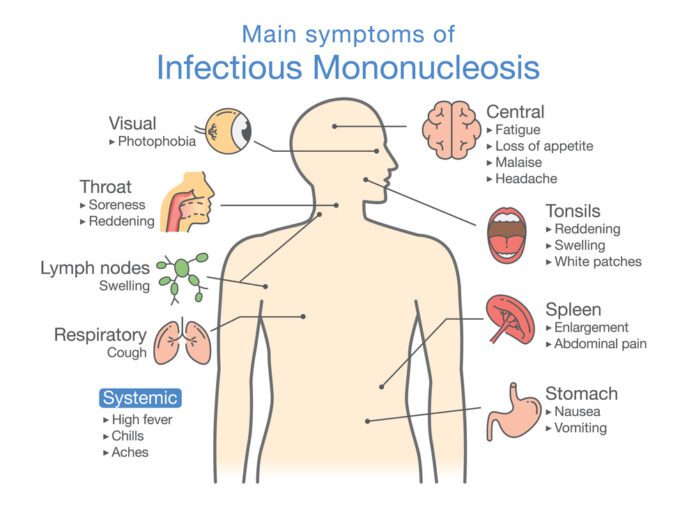Overview Of Infectious Mononucleosis
Infectious Mononucleosis is also commonly used with the term Mononucleosis. Mononucleosis, or mono, is a viral infection that causes fever, sore throat, and swollen lymph glands, most often in the neck.
Commonly Associated With
Mono; Kissing disease; Glandular fever
Causes Of Infectious Mononucleosis
Mono is often spread by saliva and close contact. It is known as “the kissing disease.” Mono occurs most often in people ages 15 to 17, but the infection may develop at any age.
Mono is caused by the Epstein-Barr virus (EBV). Rarely, it is caused by other viruses, such as cytomegalovirus (CMV).
Symptoms Of Infectious Mononucleosis
Mono may begin slowly with fatigue, a general ill feeling, headache, and sore throat. The sore throat slowly gets worse. Your tonsils become swollen and develop a whitish-yellow covering. Often, the lymph nodes in the neck are swollen and painful.
A pink, measles-like rash can occur and is more likely if you take the medicine ampicillin or amoxicillin for a throat infection. (Antibiotics are typically not given without a test that shows you have a strep infection.)
Common symptoms of mono include:
- Drowsiness
- Fever
- General discomfort, uneasiness, or ill feeling
- Loss of appetite
- Muscle aches or stiffness
- Rash
- Sore throat
- Swollen lymph nodes, most often in the neck and armpit
Less common symptoms are:
- Chest pain
- Cough
- Fatigue
- Headache
- Hives
- Jaundice (yellow color to the skin and whites of the eyes)
- Neck stiffness
- Nosebleed
- Rapid heart rate
- Sensitivity to light
- Shortness of breath
Exams & Tests
Your health care provider will examine you. They may find:
- Swollen lymph nodes in the front and back of your neck
- Swollen tonsils with a whitish-yellow covering
- Swollen liver or spleen
- Skin rash
Blood tests will be done, including:
- White blood cell (WBC) count: will be higher than normal if you have mono
- Monospot test: will be positive for infectious mononucleosis
- Antibody titer: tells the difference between a current and past infection
Treatment Of Infectious Mononucleosis
The goal of treatment is to relieve symptoms. Steroid medicine (prednisone) may be given if your symptoms are severe.
Antiviral drugs, such as acyclovir, have little or no benefit.
To relieve typical symptoms:
- Drink plenty of fluids.
- Gargle with warm salt water to ease a sore throat.
- Get plenty of rest.
- Take acetaminophen or ibuprofen for pain and fever.
- Also, avoid contact sports if your spleen is swollen (to prevent it from rupturing).



